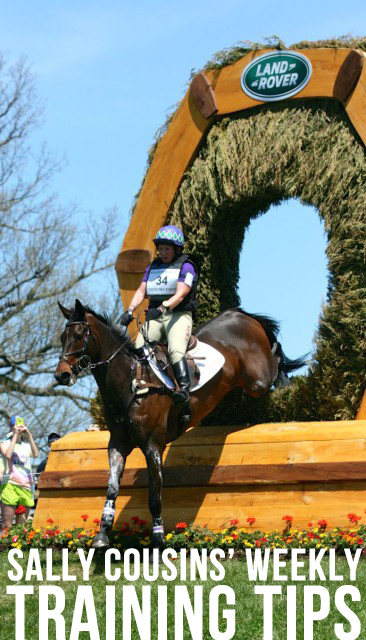We are delighted to host Sally Cousins as our newest guest blogger, as she shares her wealth of knowledge with us in the form of weekly training tips. We hope these nuggets of information can be integrated directly into your program at home and can influence the way you ride and train your horses. Be sure to check out both the Sally Cousins Eventing website and keep up with her on Facebook.

I am really bad at this. If I’m struggling with a horse, I’m sure that the next thing I try will be the solution or at least be pointing me in the right direction. This process can take years, and occasionally I have found something that works that it keeps me hoping I will figure it out.
Over time I have gotten a bit better recognizing when my horse is not appropriate for what I am asking it do. It seems obvious to say to move on from a horse that is behaving dangerously. If the horse has been previously good, I will work with a vet to see if I can find reason.
Ulcers, a poorly fitting saddle or a broken tooth are just some of the things that have caused bad behavior that can be fixed relatively easily. I have yet to know a horse with no physical issues, so it is important to have your vet help you evaluate if what they found could be causing extreme behavior.
If the horse is struggling in its work and the training has been methodical and thorough, it may mean that the work has gotten beyond its physical ability. Sometimes we can have a horse move up a level and seem to handle it well only to find it cannot sustain the work at that level.
As an example, I have helped students move a horse up to Preliminary and explained to them that the horse will be OK for one or two events at Prelim, but probably won’t be comfortable there for an extended period of time. Then it will be time to let the horse move back down to a level it can comfortably compete and to give experience to another rider.
Physical issues can make us face the decision to move on. We need to recognize when the job is too much for the horse. This can be from age, injury or illness. If the rider has a bigger commitment to the horse than to meeting goals that they have set, the expectations just need to be adjusted. Some horses are not mentally able to handle the stress of more work.
This can be frustrating if the job seems easy for them. Our horses need to be able to think, focus and make decisions under stress, and some are not able to work well under the pressure.
Some horses need more consistent work than others. Because of jobs, family or other commitments, we may not have the time to spend training the horse in the way that will produce good results. It is important then to evaluate if this horse can handle the time that we have to ride it.
Horses are wonderfully generous creatures; when I have dealt with one that is bad, the problem has often been “manmade.” This doesn’t necessarily mean we can fix it. There are some horses that are just not willing to work with us at all. I have been fortunate not to have run into many of them.



















